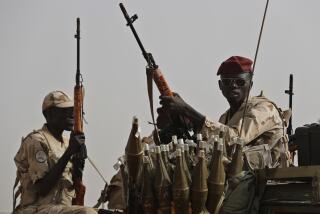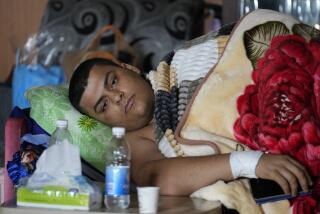Sunni split shows itself at a funeral
- Share via
BAGHDAD — A suicide bomber walked into a funeral for two cousins who had died fighting insurgents and blew himself up Thursday, killing at least 50 people, officials said. It was the latest strike in an internal war among Sunni Arabs, some of whom have aligned themselves with the Americans and others with the group Al Qaeda in Iraq.
“The gangsters threatened us not to make the funeral,” Khalaf Farhan, who was wounded in the blast, recalled from his hospital bed. “They said if we hold the funeral they will kill more of us, from our tribe.”
The residents of Bu Mohammed village, about 90 miles north of Baghdad in Diyala province, had decided to defy the warnings and bury the two men. The cousins had been kidnapped Tuesday. Their mutilated bodies were found the next day, hands and legs bound, knife wounds to the stomach and bullets in the eyes and head.
The village’s residents, members of the Azzawi tribe, had only recently formed a paramilitary unit to defend the community of about 4,500 people. Bu Mohammed sits in the Adhaim region along the Hamrin mountains, a stronghold of Sunni radicals.
The more than 100 mourners had already buried the two cousins and were sitting in the funeral tent when a man entered, Farhan recounted. The man triggered the bomb, destroying the tent. At least 40 people were wounded, police said.
“Shrapnel hit my chest and my head. I saw legs and arms scattered on the ground and heads separated from their bodies,” Farhan said.
Jabbar Abed Rahman had been preparing food at the time of the blast. The village had recently turned on those in their district backing Al Qaeda in Iraq, setting off a gangland-style war.
“We had elements from Al Qaeda in our village. When we tried to stop their extremist activities . . . they told us, ‘You either work with us against the government or you will be killed,’ ” he said.
He vowed his tribe would take revenge. “We will now dig the graves of more than 40 of our men,” he said. “We will get our revenge from the remnants of Al Qaeda who are hiding in the Hamrin mountains.”
The identity and nationality of the attacker was not immediately clear.
Bu Mohammed’s tribal leader, Sheik Mahmood Azzawi, said the village had formed its Sunni paramilitary group a month ago with the aim of confronting the militants who robbed and killed people traveling the road between Baghdad and the northern city of Kirkuk. Some of the extremist elements hailed from the Adhaim area and other sections of Diyala, and include fellow members of the Azzawi tribe as well as the Jabouri and Obeidi clans. Azzawi complained that the government was not supporting them in their fight even as they suffered huge losses.
“We decided not to be afraid of them [Al Qaeda] and their answer came with today’s atrocity that annihilated at least 50 of our best men,” Azzawi said. “We will continue battling the remnants of Qaeda. However, very regrettably we don’t get any governmental support.”
The killings were the latest assault against Sunni Arabs who have been cooperating with the U.S. military in battling militants. Some previous attacks against the Sunni fighters blamed on Al Qaeda in Iraq have been waged by fellow clansmen or warring tribes. U.S. military officials often refer to Al Qaeda in Iraq as a foreign-led group that relies on suicide bombers from other Arab countries, but the bulk of its members are Iraqi.
The Sunni paramilitary members -- commonly referred to as Sons of Iraq and many of them former insurgents -- are credited with helping reduce Iraq’s violence in the last year after breaking with their radical brethren. But the Shiite-led Iraqi government has been reluctant to embrace them.
A Western security official who spoke on condition of anonymity recently said that he believed the government was purposely dragging its feet on hiring the fighters for state jobs. A U.S. military officer in Baghdad, who also requested anonymity because he is not authorized to speak to reporters, said the government had sent out arrest lists for former Sunni insurgents who had joined the reconciliation process.
Thursday’s attack followed a spate of bombings Tuesday that killed more than 50 people in northern and central Iraq. The new push by Sunni militants comes as the government is enmeshed in a fight against Shiite Muslim armed groups in southern Iraq and Baghdad.
--
Times staff writers Said Rifai and Caesar Ahmed and special correspondents in Kirkuk and Diyala province contributed to this report.
More to Read
Sign up for Essential California
The most important California stories and recommendations in your inbox every morning.
You may occasionally receive promotional content from the Los Angeles Times.













